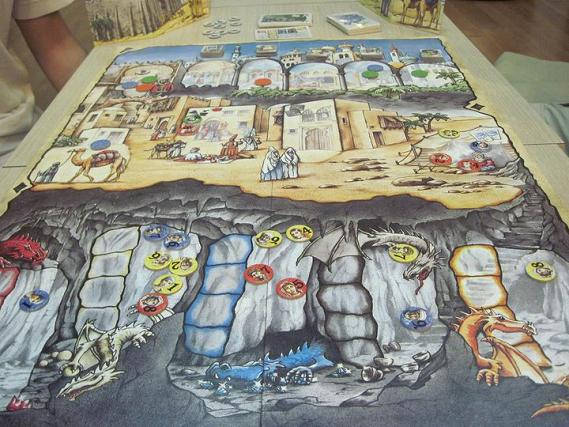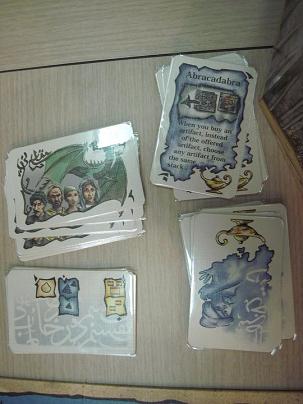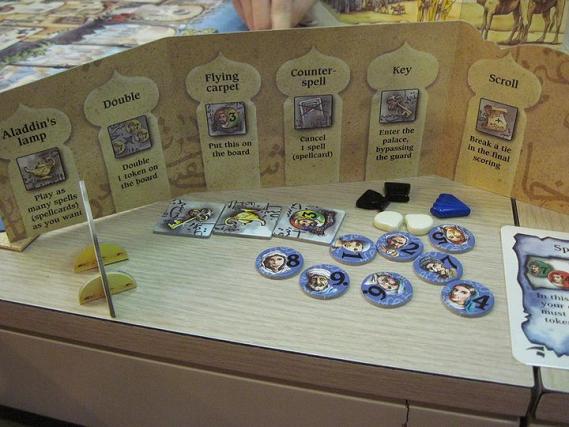27 Dec

The board and even player screens feature some very nice art, even if the game doesn’t actually need all that space.
Sean wanted us to play Aladdin’s Dragons as he had read that it was the forerunner of all worker placement games. As it turned out, everyone pretty much agreed that it felt more like a bidding game than worker placement. But everyone liked it just the same. Since it’s an old game and out of print, I’ll just do a quick summary:
- This is once again a euro game with very little theme. Did anyone know that the little chits you’re bidding with are supposed to represent adventurers? I sure didn’t until I looked it up. It’s not as bad as most. You start out in a dragon’s cave gathering treasures, then move to the city and finally try to sneak into the palace to loot the artifacts, inexplicably having to spend treasures to do so. And of course you have the special powers of the artifacts themselves and the magic spell cards adding more flavor. But it’s still a pretty abstract game. Apparently this version is even a re-themed version of an earlier self-published game.
- It’s a very, very tense game, and for a euro game, a surprisingly confrontational one as well. Each action that you take brings you to into direct opposition against another player. With the exception of the treasure spaces, it’s also an all-or-nothing affair, and as this is effectively blind bidding, that makes the stakes even higher.
- I think the scoring system lacks sufficient granularity. Each artifact you obtain acts as a point, and one artifact in particular has no powers other than to act as a tiebreaker. Since there are only six artifacts per player, and each player starts with one, it ensures that scores are always going to be very close. We played this part wrong in our session as we had four players but used five palace spaces, meaning five artifacts were available every turn. According to the original rules, with a strict one artifact per player available, it seems to me that it would be very extraordinary for someone to be able to get two artifacts in one turn.

An example of the cards.
- The special powers of the artifacts and the magic spell cards have very dramatic effects. One artifact power for example doubles the value of one of your adventurer chits. But at least the artifacts are a known quantity. The magic spells on the other hand are drawn from a deck, and some are decidedly more powerful than others. I had one card that forced everyone except me to play their chits face-up, which made for a very amusing round for me. Sean had a ridiculous one that forced everyone to pay seven treasures, an exorbitant sum, to keep their chits in the palace’s rooms. The problem is that these cards can be played anytime, so he could put his own chits in the rooms that are resolved earlier and use the card to affect just the rooms that come later. Choo apparently drew some bum cards because he never played his.
- Maybe I’m just sore because I lost this game due to Sean’s careful hoarding and playing of two spell cards in quick succession in the last round, because he knew I would be able to negate one of them using an artifact. It seems that using the cards is optional according to the official rules. I do think that they’re too random, especially there is already a good bit of uncertainty in the blind bidding, but I guess I can see why doing without would make the game too bland. One reasonable compromise I read on BGG involved using them, but forces everyone to hold all of their spell cards face up.
- Anyway, the magic spell cards vary so much that I wouldn’t consider it a fair game if one player has knowledge of which cards exist and the others don’t. They’re also so powerful that they exacerbate the already very crude scoring system. I suspect that many games share this sort of design problem. The fundamental mechanics are well thought out, and when it comes to adding cards to add flavor and variety to the game, the designer goes a bit crazy in his quest for the oddest things he can think of.
- Overall, this is still a game that I enjoyed very much. As Choo effectively commented, it’s cool how the designer achieves so much with so little. The basic rules are deceptively simple but are more than enough to add up to a very substantial game.

The player screen hiding my adventurer chits, treasures and artifacts.
Written on December 27 2010 and is filed under Boardgames.
You can follow any responses to this entry through the RSS 2.0 feed.
You can leave a response, or trackback from your own site.
2 Responses to “Aladdin’s Dragons”
I normally dislike blind bidding games, but somehow I enjoyed Aladdin’s Dragons a lot. Han has a copy, but it has been a long time since we’ve played it. I think in Aladdin’s Dragons I still feel I have some control. The blind bidding doesn’t feel as random as in other games.
I feel the same way, which is why the randomness and dramatic difference in power of the magic spell cards seems especially frustrating.
Leave a Reply